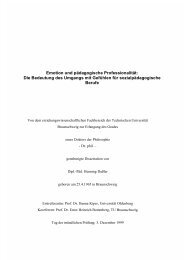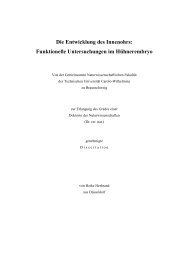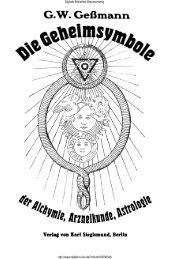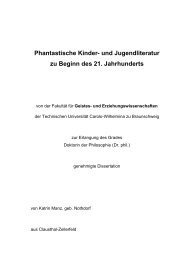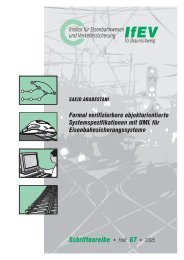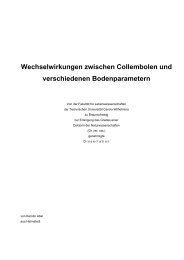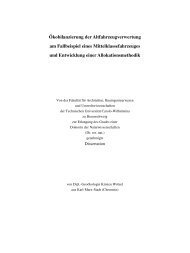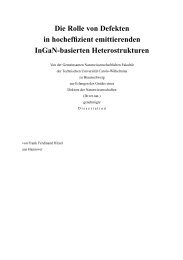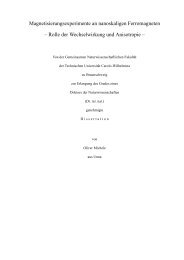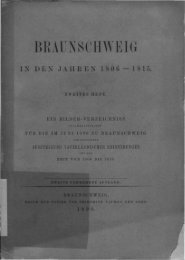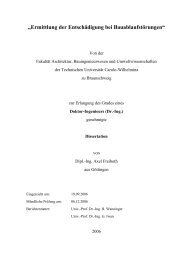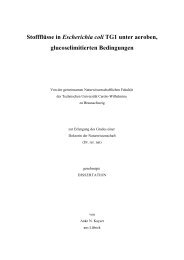Quantum Information Theory with Gaussian Systems
Quantum Information Theory with Gaussian Systems
Quantum Information Theory with Gaussian Systems
Create successful ePaper yourself
Turn your PDF publications into a flip-book with our unique Google optimized e-Paper software.
the expectation value of an arbitrary observable A in a state ρ obeys<br />
tr ρ T(A) = tr T∗(ρ)A = tr W ⊗n∗<br />
ξ T∗(Wξ ρ W ∗ ξ )W ⊗n<br />
ξ A<br />
= tr ρ W ∗ ξ T(W⊗n<br />
∗ <br />
)Wξ .<br />
ξ AW⊗n<br />
ξ<br />
3.3 Covariance<br />
(3.4)<br />
Thus, covariance of T follows from covariance of T∗ and we will in the following use<br />
the one or the other interchangeably. Using T, the fidelities can be written in a unified<br />
form as f(T, ρ) = tr[ρ T(A)], where A = ρ⊗n and A = <br />
i λi ⊗· · ·⊗ ⊗ρ (i) ⊗ · · ·⊗<br />
for f = fjoint and f = <br />
i λi fi, respectively. Furthermore, for coherent states we get<br />
f T, |ξ〉〈ξ| = tr |0〉〈0| Tξ(A) = f Tξ, |0〉〈0| , where<br />
Tξ(A) = W ∗ ξ T W ⊗n<br />
ξ AW⊗n<br />
∗<br />
ξ<br />
Wξ<br />
in strict analogy <strong>with</strong> (3.3).<br />
By applying an average Mξ over the symmetry group of phase space translations,<br />
we can define for every map T a covariant map which we denote by Tξ. However,<br />
since the group of translations is noncompact, Mξ has to be aninvariant mean[42]<br />
which does exist only by virtue of the Axiom of Choice. The cloner Tξ yields worstcase<br />
fidelities which are not lower than those achieved by T [43]. For a discussion,<br />
see the proof of<br />
Lemma 3.1:<br />
For every 1-to-n cloner T there exists a covariant cloner Tξ such that for f = fjoint<br />
or f = <br />
i λi fi<br />
f(T) ≤ f( Tξ).<br />
Remark: The cloner Tξ might besingular, i.e. its output for normal states described<br />
by a density operator ρ could be a purely singular state, which cannot be<br />
connected to any density operator. This issue is addressed in the next Section 3.3.1,<br />
where it is shown that such cloners are not optimal.<br />
Proof: The invariant mean Mξ will not be applied to T directly but to bounded<br />
phase space functions g(ξ), where Mξ g(ξ) is linear in g, positive<br />
<br />
if<br />
<br />
g is positive,<br />
<br />
normalized as Mξ[1] = 1 and indifferent to translations, Mξ g(ξ + η) = Mξ g(ξ) .<br />
For expectation functionals of a bounded operator A on the cloner output T∗ξ(ρ), the<br />
invariant mean Mξ tr T∗ξ(ρ)A is well-defined as the argument is a function bounded<br />
by A. Moreover, by the properties of Mξ it is a covariant, bounded, normalized,<br />
positive linear functional on A, which describes a state on the output ccr algebra.<br />
Since it is also linear in ρ, we can introduce a linear operator T∗ such that T∗(ρ) is<br />
the respective state. However, this state might be singular (see Section 3.3.1 below),<br />
hence T∗ has to map density operators of the input system onto the linear functionals<br />
on the output ccr algebra:<br />
T∗(ρ): B∗(H) → B ∗ (H ⊗n ), such that<br />
T∗(ρ)[A] = Mξ tr T∗ξ(ρ)A .<br />
37



